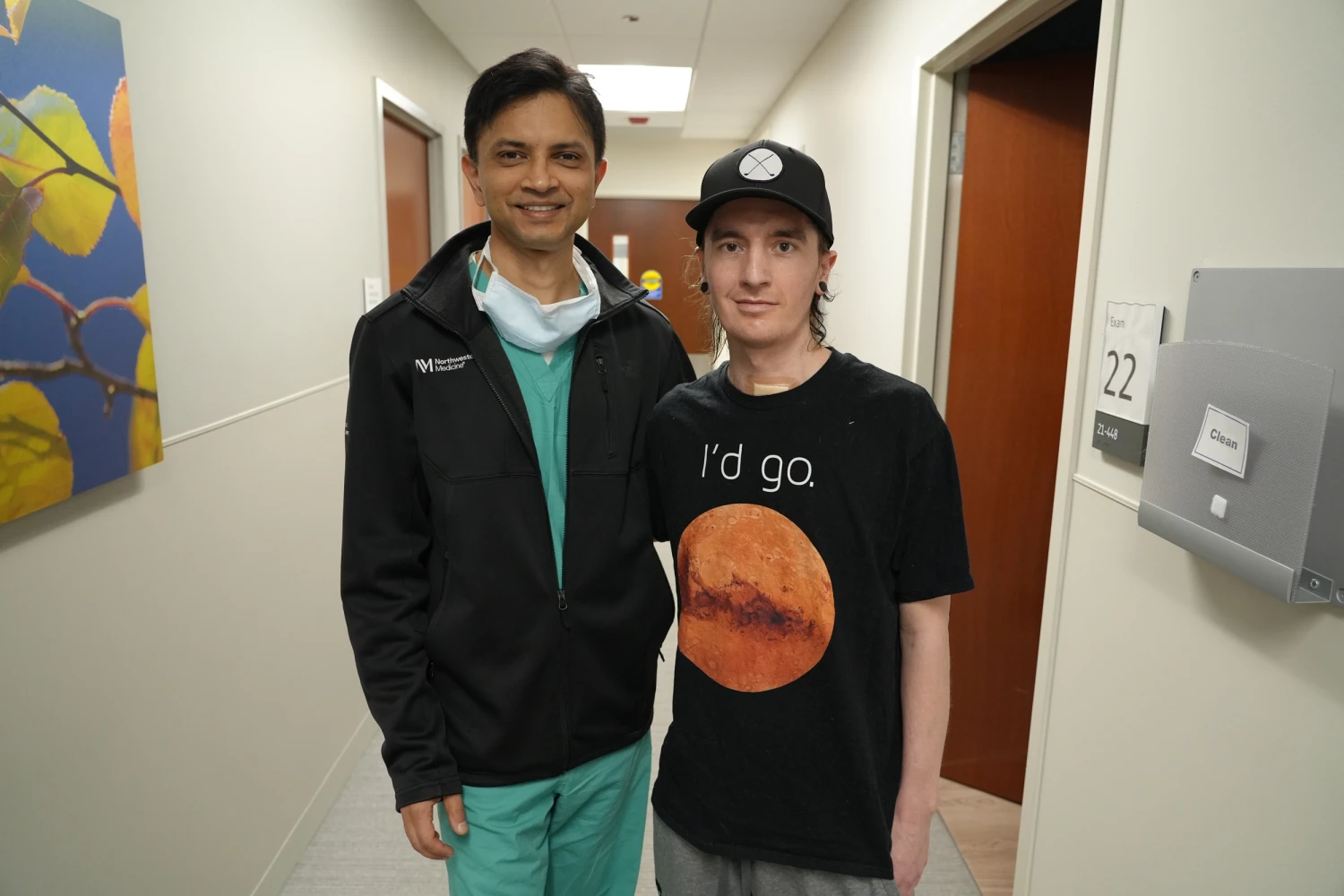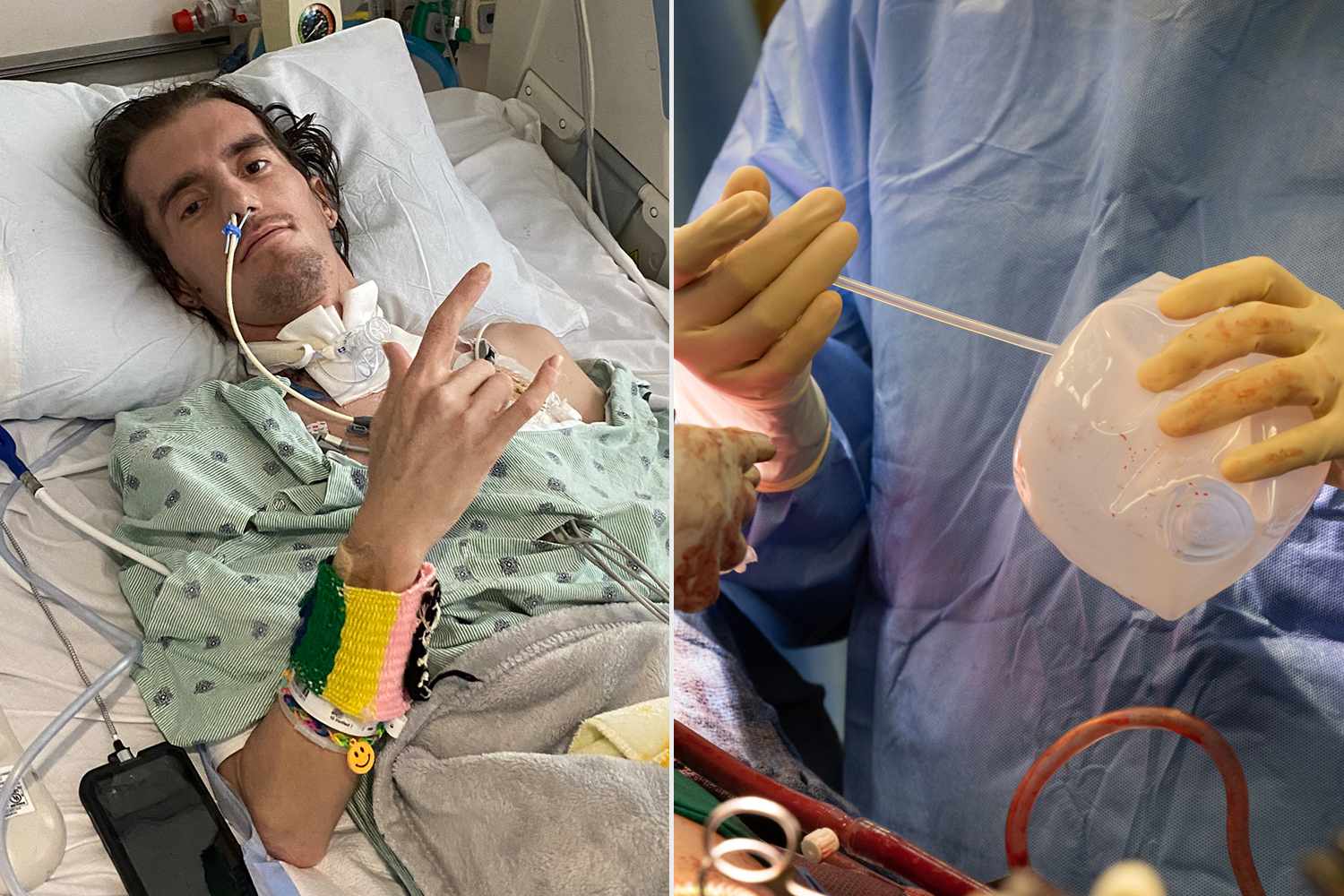When 34-year-old Davey Bauer’s lungs failed, doctors turned to an unconventional tool to save his life: large breast implants.
Experts consider this an innovative approach that allowed Bauer’s body time to fight off a severe infection and prepare for a double lung transplant, potentially setting a precedent for treating infectious diseases that were previously considered untreatable.
Bauer’s ordeal began in April when he started experiencing severe breathing difficulties.
Despite being an active snowboarder and skateboarder who maintained good health and worked in landscaping in De Soto, Missouri, Bauer had a history of smoking, starting with cigarettes at age 21 and later switching to vaping in 2014.
“I thought it was a healthier alternative,” Bauer explained. “But, honestly, I found it more addictive than cigarettes.”
Both smoking and vaping can inflame lung tissue, making it more susceptible to infections. Bauer had also skipped getting a flu shot during flu season, compounding his risks.
“All these risk factors aligned: compromised lung health due to smoking and vaping, lack of flu vaccination, and then infection,” said Dr. Ankit Bharat, Bauer’s physician and chief of thoracic surgery at Northwestern Medicine’s Canning Thoracic Institute. “Everything came together, setting him up for a major crisis.”
As Bauer’s breathing worsened, he was admitted to a hospital in St. Louis, where tests confirmed he had the flu. Despite treatment, his condition deteriorated further as he developed a severe lung infection resistant to antibiotics.
Doctors resorted to using extracorporeal membrane oxygenation (ECMO), a device that pumps and oxygenates blood outside the body to allow the lungs and heart to rest and heal.
However, Bauer’s lungs were too damaged for this to suffice, and he urgently needed a double lung transplant.
He was transferred to Northwestern Memorial Hospital in Chicago, but his health took a critical turn for the worse shortly after arrival.
“The day after he came, he essentially coded—his heart stopped, and CPR was initiated. That’s how dire his situation was,” Bharat recalled.
Unlike typical lung transplant cases, which often involve chronic conditions like emphysema or cystic fibrosis where patients can wait for donor lungs, Bauer’s acute lung failure left no time to wait.
His condition was too fragile for immediate transplant surgery.
“Normally, someone as critically ill as David would have no transplant option and would likely not survive,” Bharat explained. “We had to devise a strategy that had never been attempted before.”
Bharat, known for successful lung transplants in patients with severe infections and late-stage cancers, faced the challenge of first controlling Bauer’s infection.
“When we opened his chest, it was filled with pus—yellow, foul-smelling material,” Bharat described.
Surgeons meticulously removed the infected lungs while taking care not to spread germs, thoroughly cleansing the area and administering powerful antibiotics.
Initially expected to take weeks, Bauer surprisingly responded within days, showing signs of improvement that made transplantation feasible.
“He miraculously began to look much better, and we felt confident proceeding with the transfer,” Bharat said.

Another hurdle was maintaining blood circulation in Bauer’s body while awaiting clearance from infection to proceed with the transplant.
Bharat likened the heart-lung system to a highway with separate lanes—one carrying blood from the heart to the lungs for oxygenation, and the other returning oxygenated blood to the heart for distribution throughout the body.
Removing the lungs disrupts this system entirely, making immediate survival impossible.
To circumvent this challenge, doctors adapted parts of the ECMO device to create artificial channels for blood circulation throughout Bauer’s body.
“I spent the entire night contemplating how to create these channels and manage these issues,” Bharat recounted.
A final obstacle was stabilizing Bauer’s heart, a central organ prone to shifting and potentially compromising blood flow during surgery.
“Lab sponges weren’t suitable, so we needed a material that could mold within his chest cavity.
That’s where the breast implants came in—Double-D implants placed inside his chest temporarily secured his heart in its correct position,” Bharat explained.
The entire process unfolded rapidly. Bauer’s diseased lungs were removed on May 26, and the following day, donor lungs became available.
On May 28, surgeons removed the implants and successfully transplanted the donor lungs.
Northwestern’s medical team informed Bauer’s family that his case was among the most complex they had ever encountered.
“He’s on a path to full recovery, which is truly remarkable for us to witness,” Bharat remarked.
Dr. Yoshiya Toyoda, a transplant surgeon not involved in Bauer’s case, acknowledged the heightened risks associated with multiple procedures compared to traditional lung transplants, which involve a single surgery.
Managing artificial blood circulation also increases the risk of clot formation leading to strokes.
“Despite these challenges, I congratulate them on their success,” Toyoda added.
By June, Bauer was sitting up and breathing independently for several hours at a time, as noted on the family’s Gofundme page. By mid-June, he was weaned off breathing machines altogether, relying solely on his new lungs.
Recovery required months in intensive care, but by late September, Bauer’s health had improved sufficiently for discharge, with ongoing therapy planned at a rehabilitation facility outside the hospital.
Dr. Albert Rizzo, Chief Medical Officer of the American Lung Association, commended the innovative approach employed and noted its significance in Bauer’s successful recovery.
“Transplant surgeons I spoke with also considered it innovative,” he remarked. “It’s truly an ingenious approach to tackling a challenging medical problem.”
Despite the positive outcome, Bauer will remain in Chicago for the next year under close monitoring by his Northwestern doctors.
While he hasn’t yet adopted the local team loyalty by becoming a Cubs fan, he has embraced the innovation that saved his life.
Bauer reportedly informed Northwestern’s medical team that he intends to update all his gaming profiles and wear a custom-made t-shirt featuring his new nickname: “DD Davey.”
